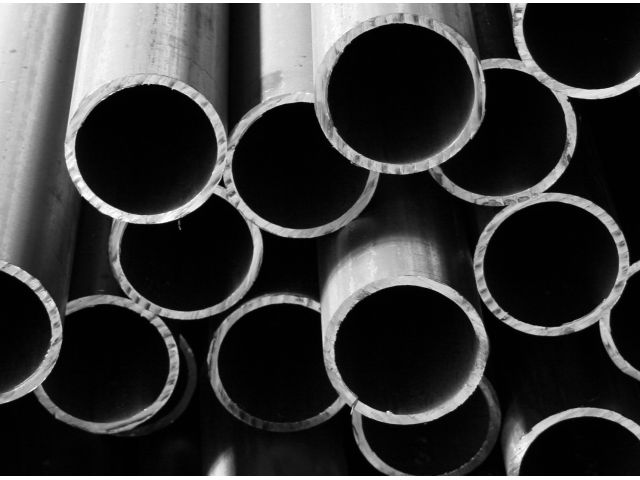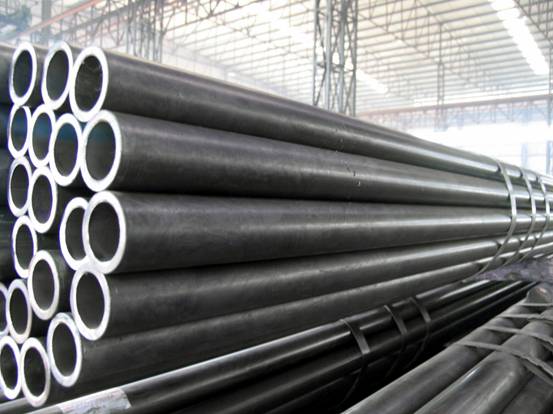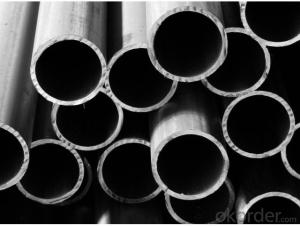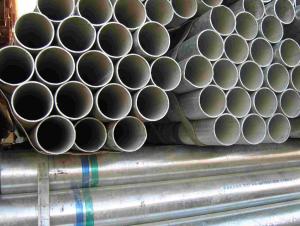Seamless Steel Alloy Pipe with Factory Price
- Loading Port:
- Qingdao
- Payment Terms:
- TT or LC
- Min Order Qty:
- 2000 PCS
- Supply Capability:
- 48000 PCS/month
OKorder Service Pledge
OKorder Financial Service
You Might Also Like
OKorder is offering high quality Seamless Steel Alloy Pipe at great prices with worldwide shipping. Our supplier is a world-class manufacturer of steel pipe, with our products utilized the world over. OKorder annually supplies products to European, North American and Asian markets. We provide quotations within 24 hours of receiving an inquiry and guarantee competitive prices.
Product Applications:
Seamless Steel Alloy Pipe is ideal for long distance oil, gas, and natural gas pipelines on land and offshore. They can also be applied in construction projects, offshore platforms, power stations, the petrochemical industry and municipal construction.
Product Advantages:
OKorder's Steel Pipe is durable, resists corrosion and is recyclable.
Main Product Features:
· Premium quality
· Prompt delivery & seaworthy packing (30 days after receiving deposit)
· Corrosion resistance
· Professional Service
· Competitive pricing
Product Specifications:
Grade: A213 A335 A199
Certification: Mill test certificate, EN 10204/31B
Dimensions:
Wall Thickness: 0.250" – 4.00" (hot finish), 0.035" – 0.875" (cold drawn)
Outer Diameter: 2" - 30" (hot finish), 0.875" - 18" (cold drawn)
Treatment: Annealed, fully annealed, bright annealed, spheroidize annealed, normalized, stress relieved, cold finished, quenched, tempered
Testing: Chemical component analysis, mechanical properties (ultimate tensile strength, yield strength, elongation), technical properties (flattening, flaring, bending, hardness, impact, etc), exterior size inspection
MOQ: 25 tons
Packaging: Bundle, beveled or plain end, varnish, PVC end caps
FAQ:
Q1: Why buy Materials & Equipment from OKorder.com?
A1: All products offered byOKorder.com are carefully selected from China's most reliable manufacturing enterprises. Through its ISO certifications, OKorder.com adheres to the highest standards and a commitment to supply chain safety and customer satisfaction.
Q2: How do we guarantee the quality of our products?
A2: We have established an advanced quality management system which conducts strict quality tests at every step, from raw materials to the final product. At the same time, we provide extensive follow-up service assurances as required.
Q3: How soon can we receive the product after purchase?
A3: Within three days of placing an order, we will begin production. The specific shipping date is dependent upon international and government factors, but is typically 7 to 10 workdays.
Q4: What makes stainless steel stainless?
A4: Stainless steel must contain at least 10.5 % chromium. It is this element that reacts with the oxygen in the air to form a complex chrome-oxide surface layer that is invisible but strong enough to prevent further oxygen from "staining" (rusting) the surface. Higher levels of chromium and the addition of other alloying elements such as nickel and molybdenum enhance this surface layer and improve the corrosion resistance of the stainless material.
Q5: Can stainless steel rust?
A5: Stainless does not "rust" as you think of regular steel rusting with a red oxide on the surface that flakes off. If you see red rust it is probably due to some iron particles that have contaminated the surface of the stainless steel and it is these iron particles that are rusting. Look at the source of the rusting and see if you can remove it from the surface.
Q6: What is the difference between galvanized steel and galvalume steel?
A6: Galvanized steel is metallic coated with Zinc in various coating weights. Minimum recommended for painted metal roofs is G90. Galvalume is a zinc and aluminum coated steel that becomes an alloy and is recommended in either painted or bare applications with a minimum coating weight of AZ50. Galvalume has an excellent performance life in bare exposures. Hence if you are using a bare panel use galvalume and if painted use either.
Q7: Is there a difference in thermal conductivity between stainless steel and steel?
A6: Yes. Stainless Steel has a lower thermal conductivity rate than steel; approximately 1/3 to 1/5th depending on the material.
Q8: Is there a difference in electrical conductivity between stainless steel and steel?
A8: Yes. Steel is generally more conductive than stainless steel. Steel has resistivity in the range of 10~20Ωm, while stainless has a resistivity of approximately 60~72Ωm.
Images:


- Q:How do you determine the weight per foot of a steel pipe?
- To determine the weight per foot of a steel pipe, you need to know its outer diameter, wall thickness, and the density of steel. Using these measurements, you can calculate the cross-sectional area of the pipe, which is then multiplied by the length of the pipe to find its volume. Finally, multiplying the volume by the density of steel gives you the weight per foot of the steel pipe.
- Q:Can steel pipes be used for sewer systems?
- Yes, steel pipes can be used for sewer systems. Steel pipes are commonly used in sewer systems due to their durability, strength, and resistance to corrosion. They are able to withstand the harsh conditions and high pressure of sewage flow, making them a reliable choice for sewer infrastructure.
- Q:Can steel pipes be used for irrigation systems?
- Yes, steel pipes can be used for irrigation systems. They are strong, durable, and resistant to corrosion, making them suitable for transporting water and withstanding outdoor conditions. However, it is important to ensure proper insulation and maintenance to prevent any potential rust or degradation.
- Q:What is the outer diameter of the steel tube?
- The diameter of a steel pipe refers to the diameter of the steel pipe. The specifications of the steel tube is normal with diameter (diameter and thickness) said, for example 100MM outer diameter and wall thickness of 5MM tube is marked with 100*5.
- Q:What connections are there for concrete filled steel tubular column foundations?
- Strengthening ring joint is a more common in the construction of steel pipe concrete column construction, it is to beam column connection through the upper and lower plate reinforcing ring bending force transmission way is through two to strengthen the uniform arrangement between the rings radial ribs and rib structure to connect with the ring the pipe wall at the top of the plate, so as to transfer the shear stress, so as to strengthen the thickness and improve the quality of connection engineering advantage. In the process of engineering construction, according to the construction principle of longitudinal reinforcement of Deng Qiang to control, so that the smaller width of not less than the replacement of the width of the connecting plate 70%, also need to be given due attention in the form of node selection
- Q:Can steel pipes be used for drainage systems?
- Yes, steel pipes can be used for drainage systems. Steel pipes are durable, strong, and resistant to corrosion, making them suitable for various applications, including drainage systems. They can effectively transport water and waste materials, ensuring efficient drainage.
- Q:What are the factors that affect the lifespan of steel pipes in different environments?
- The factors that affect the lifespan of steel pipes in different environments include the presence of corrosive substances, such as chemicals or saltwater, which can corrode the steel and lead to degradation over time. Other factors include temperature fluctuations, which can cause expansion and contraction of the steel, leading to stress and potential cracking. The quality of the protective coating on the pipes also plays a role, as a strong and durable coating can provide better resistance against corrosion and prolong the lifespan of the pipes. Additionally, the maintenance and regular inspection of the pipes, including cleaning and repairs, can help identify and address any issues early on, preventing further damage and extending their lifespan.
- Q:Can steel pipes be used for underground water treatment systems?
- Certainly, underground water treatment systems can utilize steel pipes. Renowned for their durability, strength, and resistance to corrosion, steel pipes prove themselves suitable for a range of uses, including underground water treatment systems. They possess the ability to endure the pressure and environmental circumstances found underground, guaranteeing the secure and effective conveyance of water within the treatment system. Nevertheless, it is crucial to take into account the water quality and the likelihood of corrosion in the particular location when opting for the type of steel and implementing safeguarding measures, such as coatings or cathodic protection, to avert corrosion and ensure the pipes' longevity.
- Q:What is the difference between steel pipes and polyethylene pipes?
- Steel pipes are made of a strong and durable material, steel, which makes them suitable for high-pressure and high-temperature applications. They are also resistant to corrosion, making them ideal for transporting liquids and gases. On the other hand, polyethylene pipes are made of a flexible plastic material, which makes them easier to install and handle. They are lightweight, resistant to chemicals, and have a low risk of corrosion. However, they may not be suitable for very high-pressure or high-temperature applications.
- Q:What are the different types of steel pipe coatings for corrosive environments?
- There are several types of steel pipe coatings specifically designed for corrosive environments. Some common options include fusion-bonded epoxy (FBE) coatings, liquid epoxy coatings, polyethylene (PE) coatings, and polyurethane (PU) coatings. These coatings provide a protective layer to prevent corrosion and extend the lifespan of the steel pipes in various corrosive conditions.
1. Manufacturer Overview |
|
|---|---|
| Location | |
| Year Established | |
| Annual Output Value | |
| Main Markets | |
| Company Certifications | |
2. Manufacturer Certificates |
|
|---|---|
| a) Certification Name | |
| Range | |
| Reference | |
| Validity Period | |
3. Manufacturer Capability |
|
|---|---|
| a)Trade Capacity | |
| Nearest Port | |
| Export Percentage | |
| No.of Employees in Trade Department | |
| Language Spoken: | |
| b)Factory Information | |
| Factory Size: | |
| No. of Production Lines | |
| Contract Manufacturing | |
| Product Price Range | |
Send your message to us
Seamless Steel Alloy Pipe with Factory Price
- Loading Port:
- Qingdao
- Payment Terms:
- TT or LC
- Min Order Qty:
- 2000 PCS
- Supply Capability:
- 48000 PCS/month
OKorder Service Pledge
OKorder Financial Service
Similar products
New products
Hot products
Hot Searches
Related keywords






























